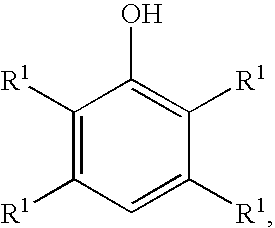Processes for preparing benzoquinones and hydroquinones
a technology of hydroquinones and hydroquinones, which is applied in the field of hydroquinone compounds, can solve the problems of undesired chloro-substituted compounds, high oxygen pressure, and need for stoichiometric amounts of expensive oxidizing agents, and achieves high selectivity, high conversion, and cost-effective
- Summary
- Abstract
- Description
- Claims
- Application Information
AI Technical Summary
Benefits of technology
Problems solved by technology
Method used
Image
Examples
example 1
[0037] In this example, a lithium trichloro cuprate dihydrate catalyst stock solution was prepared. A mixture of cupric chloride (40.02 gm) and lithium chloride (9.97 gm) were placed in a 100 milliliter (ml) volumetric flask and the volume made up to 100 ml with water.
example 2
[0038] In this example, 2-methyl hydroquinone was prepared. A mixture of ortho-cresol (127 grams (g)), lithium trichoro cuprate dihydrate solution (22.3 milliliters) as prepared in Example 1, N-methylpyrrolidone (41.81 g), acetic acid (41.81 g) and methyl isobutyl ketone (842.64 g) was charged to a 3.7 liter Parr vessel. The pressure vessel was closed and pressurized with oxygen to 35 N / cm2 and depressurized to atmospheric pressure. This was repeated thrice. The reactor was heated to 50° C. and pressurized with oxygen to a pressure of 70 N / cm2. This pressure was maintained throughout the experiment by replenishment with oxygen as needed. The reaction was monitored by high-performance liquid chromatography (HPLC) for the conversion of ortho-cresol and the selectivity of conversion to methyl benzoquinone. After about 24 hours, the conversion of ortho-cresol was 74.7% with a selectivity of conversion to methyl-benzoquinone of 74.5%. The reactor was cooled to room temperature (25° C.) a...
example 3
[0042] In this example, 2-methyl hydroquinone was prepared by following the same procedure as mentioned in Example 2 except that ortho-cresol (61.97 grams), lithium trichoro cuprate dihydrate solution (11.99 g), N,N-dimethylformamide (20.88 g), acetic acid (11.27 g) and methyl isobutyl ketone (419.12 g) were used. After about 24 hours, the conversion of ortho-cresol was 77% with a selectivity of conversion towards methyl-benzoquinone of 83%. Reduction of the methyl benzoquinone reaction mixture was carried out in the same manner as described in Example 2, except in this case the entire reaction mixture was taken for reduction. The conversion of methyl benzoquinone was quantitative with a selectivity of conversion towards methyl hydroquinone of 62%. After about 5.5 hrs, the product was isolated in the same manner as in Example 2. The yield of pure product obtained was 16.46 grams.
PUM
| Property | Measurement | Unit |
|---|---|---|
| Temperature | aaaaa | aaaaa |
| Temperature | aaaaa | aaaaa |
| Pressure | aaaaa | aaaaa |
Abstract
Description
Claims
Application Information
 Login to View More
Login to View More - R&D
- Intellectual Property
- Life Sciences
- Materials
- Tech Scout
- Unparalleled Data Quality
- Higher Quality Content
- 60% Fewer Hallucinations
Browse by: Latest US Patents, China's latest patents, Technical Efficacy Thesaurus, Application Domain, Technology Topic, Popular Technical Reports.
© 2025 PatSnap. All rights reserved.Legal|Privacy policy|Modern Slavery Act Transparency Statement|Sitemap|About US| Contact US: help@patsnap.com


